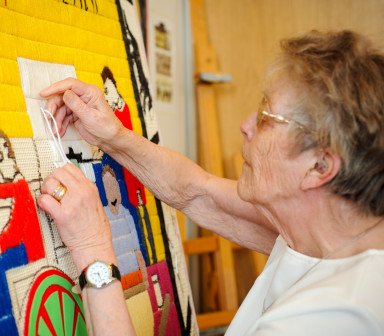A glaucoma diagnosis can feel like a very worrying time for both the person affected and those close to them, especially when faced with understanding the symptoms and navigating potential treatment options.
If you are on the receiving end of such news, it naturally raises a whole host of questions and emotions surrounding how to cope, what the symptoms might mean for you, and what the future will hold.
But there is help out there, and with the right advice, a clear understanding of the symptoms, and by taking things one step at a time, there is no reason why glaucoma should stop you leading a full, exciting life.
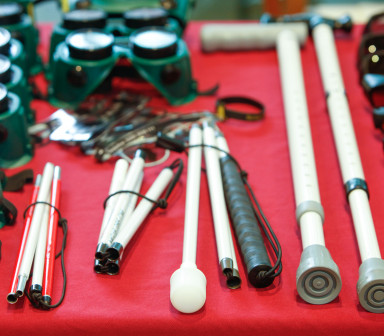
Katrina Campbell is a Rehabilitation Officer at sight loss charity Sight Scotland Veterans. With 17 years’ experience of working with people with vision impairments, including training and eight years working with Guide Dogs, contract rehab worker roles in Dumfries and Galloway, Glasgow and Falkirk before joining Sight Scotland Veterans, Katrina has been based at Sight Scotland Veterans' Hawkhead Centre in Paisley since its opening in October 2017.
She works closely with veterans with sight loss due to a wide range of conditions, including glaucoma, on a daily basis. She carries out one-to-one assessments and applies her expertise in order to ensure each individual receives the most suitable equipment, training, support and advice from Sight Scotland Veterans, enabling them to live as independently as possible with their eye condition.
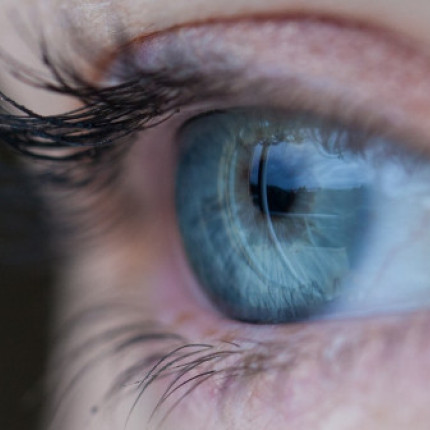
Below, Katrina answers the questions and concerns she often encounters as she supports people living with glaucoma.
You can also listen to the audio recording here which shares more information about Glaucoma.
What is Glaucoma?
Glaucoma is a common eye condition, which is generally caused by a build-up of pressure in the eye due to the fluid being unable to drain properly. This increase in pressure then damages the optic nerve that which sends the images from the eye to the brain.
Damage to the optic nerve affects the edge of your vision (your peripheral vision) first. As a result, Glaucoma often goes unnoticed and is only picked up at a routine eye test.
People are more at risk of developing Glaucoma with age. It is less common in people under the age of 40.
People of Afro-Caribbean origin and those with a family history of Glaucoma are also at a higher risk, as are people with diabetes, high blood pressure or short or long sightedness. There is also increased risk associated with taking certain medications.
Glaucoma diagnosis
It is important that a diagnosis is made as early as possible to effectively control Glaucoma.
As the condition affects the edges of your vision (peripheral vision) first, it is often only picked up during a routine eye test.
Everyone should have an eye test at least every two years, and anyone with high risk factors (for example, a close relative with glaucoma) should be tested every year. Contact your optician immediately if you notice any change or deterioration in your vision.
During a routine eye examination, the following tests may show that you have signs of Glaucoma.
- Visual Field Test – to check your peripheral vision
- Eye Pressure Test – measures the pressure within the eye
- Optic Nerve Assessment – looking at the back of the eye to check the health of the optic nerve. This will look different if you have Glaucoma.
If the Optometrists finds signs of Glaucoma while carrying out the above tests, they will refer you to an Ophthalmologist at a hospital.
Glaucoma treatment
Glaucoma cannot be cured or reversed but with the right medical treatment, the damage can be slowed or in some cases, stopped. Many people with Glaucoma do not have sight loss as treatment prevents this. But if left untreated, Glaucoma can lead to irreversible sight loss.
Glaucoma can be treated using medicines, eye-drops, laser treatment or surgery. The treatment needed will depend on the type of Glaucoma diagnosed and the persons health and medical history.
Eye drops are one of the most commonly prescribed treatments for Glaucoma. There are several different types of drops that can be used, which ultimately all work by reducing the pressure in your eyes.
Congenital glaucoma
Congenital glaucoma occurs in babies born with a problem in their eye that prevents fluid from draining normally. Children with congenital glaucoma may have:
- Have cloudy eyes
- Sensitivity to light
- Produce extra tears
- May have eyes that are larger than normal because of the pressure build up in the eye
In most cases, if babies get diagnosed and surgery carried out early enough, they usually won’t have any permanent vision loss.
Several other types of glaucoma can also develop in children and secondary childhood glaucoma may occur where there is an underlying medical condition.
Life with Glaucoma
There is no reason why someone with Glaucoma cannot continue to lead a full and active life with the correct aids. Depending on the severity of the condition, most people can continue to read, cook, etc. Due to the loss of peripheral vision, tasks such as going to the shops or getting to work may be more challenging, but the right tools can help
A symbol cane is a small, folding white cane that can be carried in a bag or pocket and used when required to help make other people more aware. A guide cane is longer and thicker and thus more visible to others. They generally extend from the floor to the user's waist and can be used to scan for kerbs and steps, as well as diagonally across the body for protection, warning the user of obstacles immediately ahead.
A long cane can be used to test and provide information about the environment around the user. The long cane is the best-known style of white cane. It is used by sweeping it across the area in front of you and so can provide you a great deal of information on the terrain ahead as well as warning of obstacles in front of you. This cane combines the advantages of the symbol and guide canes with the maximum aid to mobility.
A rehabilitation officer can work with you to identify your needs and provide the correct type of tools and training, as well as additional useful items such as anti-glare glasses.
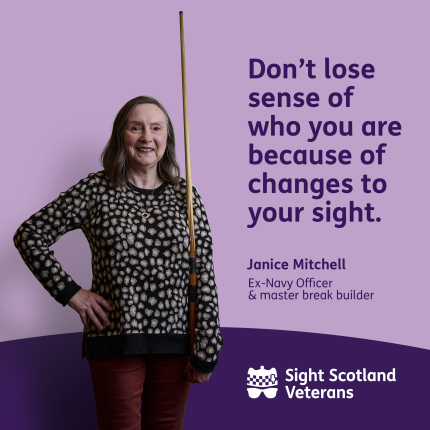
How we can help
We strive to connect people impacted by sight loss across Scotland offering practical advice and emotional support. If you're looking for support for yourself, a loved one or someone you support, our team can be there for you. Our Family Wellbeing Team can offer support online, over the phone, and in-person during a home visit, and can give advice and practical and emotional support.
Call our free support line today: 0800 024 8973
Our freephone support line is open Monday to Friday 9am till 5pm. If you prefer not to call, or our lines aren't open, you can reach us by completing our online form.
Find out more about the ways we can help you or someone you know navigate a sight loss condition.
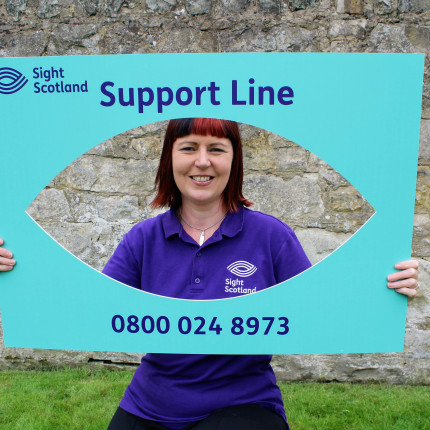
A study on testing for Glaucoma at home
A research team from the University of Edinburgh carried out a study which explored home tests for Glaucoma, investigating whether self-testing of pressure levels inside the eye by patients could be a beneficial alternative to these tests being carried out at hospital or optometrist appointments. The Royal College of Surgeons of Edinburgh provided advisory support to this study, which was funded by Sight Scotland.
The study indicated that tonometry – the method used by eye specialists to measure intraocular pressure (IOP) – carried out by patients at home using a self testing device, could help to better identify if and when eye pressure levels are high. This improves the ability for eye doctors to determine the risk of worsening sight loss from Glaucoma, as well as the types of treatment that each patient should receive.
Glaucoma is caused by a build up of fluid inside the eye leading to high eye pressure. The high pressure then causes damage to the optic nerve, which connects the eye and brain. Damage to the optic nerve causes gradual and irreversible loss of vision.
Currently, eye pressure measurements can only be taken using specialist equipment in optometry or hospital clinics. The study found an alternative approach of home monitoring could increase the number of pressure measurements, due to there being no restriction on day or time for testing to take place, and so provide a better indication of when IOP levels are high and whether treatments are working.
